Flags of the U.S. states and territories
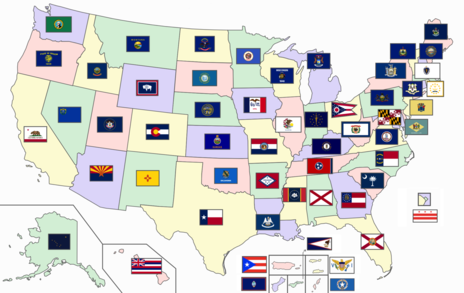
The flags of the U.S. states, territories, and the District of Columbia exhibit a variety of regional influences and local histories, as well as different styles and design principles. Nonetheless, the majority of the states' flags share the same design pattern consisting of the state seal superimposed on a monochrome background, commonly a shade of blue.
The most recently adopted state flag is that of Mississippi, adopted on January 11, 2021, while the most recently adopted territorial flag is that of the Northern Mariana Islands, adopted on July 1, 1985.
History[]
Modern U.S. state flags as contemporarily understood date from the turn of the 20th century, when states wanted to have distinctive symbols at the 1893 World's Columbian Exposition in Chicago, Illinois. Most U.S. state flags were designed and adopted between 1893 and World War I.[1]
According to a 2001 survey by the North American Vexillological Association, New Mexico has the best-designed flag of any U.S. state, U.S. territory, or Canadian province, while Georgia's state flag was rated the worst design[2] (Georgia adopted a new flag in 2003; Nebraska's state flag, whose design was rated second worst, remains in use to date).
Current state flags[]
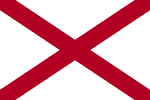
Flag of Alabama
(February 16, 1895)[3]
Flag of Alaska
(July 6, 1927)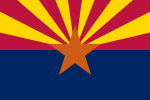
Flag of Arizona
(January 25, 1917)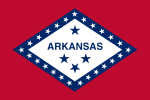
Flag of Arkansas
(March 16, 1924)
Flag of California
(February 3, 1911)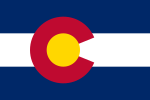
Flag of Colorado
(March 31, 1964)
Flag of Connecticut
(September 9, 1897)
Flag of Delaware
(July 24, 1913)
Flag of Florida
(May 21, 1985)
Flag of Georgia
(February 19, 2003)
Flag of Hawaii
(December 29, 1845)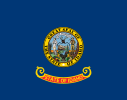
Flag of Idaho
(November 2, 1957)
Flag of Illinois
(June 27, 1969)
Flag of Indiana
(May 31, 1917)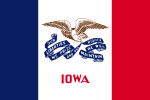
Flag of Iowa
(March 12, 1921)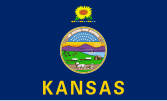
Flag of Kansas
(September 22, 1961)
Flag of Kentucky
(March 26, 1918)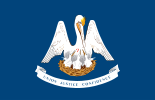
Flag of Louisiana
(November 22, 2010)[4]
Flag of Maine
(June 16, 1909)
Flag of Maryland
(November 25, 1904)
Flag of Massachusetts
(March 21, 1908)
Flag of Michigan
(June 26, 1911)
Flag of Minnesota
(August 2, 1983)
Flag of Mississippi
(January 11, 2021)[5][6]
Flag of Missouri
(September 4, 1913)
Flag of Montana
(July 1, 1981)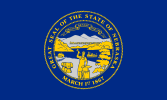
Flag of Nebraska
(July 16, 1963)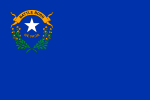
Flag of Nevada
(July 25, 1991)
Flag of New Hampshire
(November 30, 1931)
Flag of New Jersey
(January 15, 1896)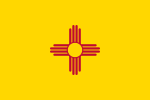
Flag of New Mexico
(September 18, 1920)
Flag of New York
(April 1, 1901)
Flag of North Carolina
(June 24, 1991)[7]
Flag of North Dakota
(March 11, 1911)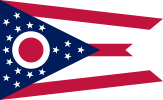
Flag of Ohio
(May 9, 1902)
Flag of Oregon (reverse)[10]

Flag of Pennsylvania
(April 24, 1907)
Flag of Rhode Island
(July 27, 1640, formally November 1, 1897)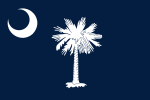
Flag of South Carolina
(January 28, 1861)
Flag of South Dakota
(November 9, 1992)
Flag of Tennessee
(February 3, 1905)
Flag of Texas
(January 25, 1839)
Flag of Utah
(1913 and February 16, 2011)[a]
Flag of Vermont
(April 17, 1923)
Flag of Virginia
(February 1, 1950)[13]
Flag of Washington
(March 5, 1923)[14]
Flag of West Virginia
(November 6, 1929)
Flag of Wisconsin
(May 1, 1981)[15]
Flag of Wyoming
(March 4, 1917)
Other state flag[]

Utah Commemorative Flag
Current federal district flag[]
This is the current flag of the District of Columbia.

Flag of the District of Columbia
(federal district)
(October 15, 1938)
Current territory flags[]
These are the current official flags of the five permanently-inhabited territories of the United States. Dates in parenthesis denote when the territory's current flag was adopted by its respective political body.

Flag of American Samoa
(April 17, 1960)
Flag of Guam
(February 9, 1948)
Flag of the Northern Mariana Islands
(July 1, 1985)
Flag of Puerto Rico
(July 24, 1952)
Flag of the U.S. Virgin Islands
(May 17, 1921)
Current state ensigns[]
Maine and Massachusetts have ensigns for use at sea.

Naval and Maritime Flag of Massachusetts
(1971)
Historical state and territory flags[]
Former state flags[]
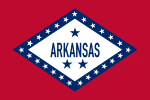
Flag of Arkansas
(February 26, 1913–1923)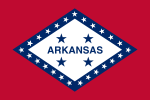
Flag of Arkansas
(1923–1924)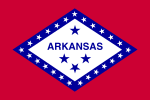
Flag of Arkansas
(1924–2011)
Flag of Colorado
(1907 – December 4, 1911)
Flag of Colorado
(December 4, 1911 – March 31, 1964)
Flag of Florida
(September 1868 – November 1900)[16]
Flag of Florida
(November 1900 – May 1985)[16]
Variant flag of Georgia
(de facto, 1861–1865)
Flag of Georgia
(1879–1902)
Flag of Georgia
(1902–1906)
Flag of Georgia
(1906–1920)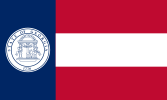
Flag of Georgia
(1920–1956)
Flag of Georgia
(1956–2001)
Flag of Georgia
(2001–2003)
Flag of Illinois
(1915–1969)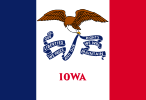
Flag of Iowa
(1921–2018)
Flag of Kansas
(1927 – September 24, 1961)
Flag of Kentucky
(March 26, 1918–1963)
Flag of Louisiana
(January 1861, unofficial)
Flag of Louisiana
(February 1861–1912)[17]
Flag of Louisiana
(1912 – May 7, 2006)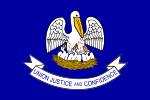
Flag of Louisiana
(May 7, 2006 – November 22, 2010)
Flag of Maryland
(pre-1904)
Flag of Massachusetts
(reverse, 1908–1971)
Flag of Maine
(1901–1909)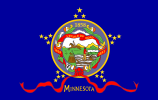
Flag of Minnesota
(January – February 28, 1893)
Flag of Minnesota
(obverse, February 28, 1893 – August 1957)
Flag of Minnesota
(reverse, February 28, 1893 – August 1957)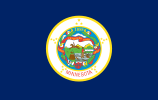
Flag of Minnesota
(August 1957 – August 1983)
Flag of Mississippi
(March 30, 1861 – August 22, 1865)
Flag of Mississippi
(April 23, 1894 – 1996)
Flag of Mississippi
(1996 – February 7, 2001)
Flag of Mississippi
(2001 – June 30, 2020)
Flag of Montana
(1905 – July 1, 1981)
Flag of New Hampshire
(1909 – November 30, 1931)
Flag of New York
(1778 – April 2, 1901)
Flag of Nevada
(July 20, 1905–1915)
Flag of Nevada
(1915–1929)
Flag of Nevada
(1929 – July 25, 1991)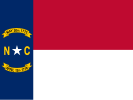
Flag of North Carolina
(March 1885 – June 24, 1991)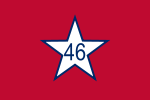
Flag of Oklahoma
(1911–1925)
Flag of Oklahoma
(1925–1941)
Flag of Oklahoma
(1941–1988)
Flag of Oklahoma
(1988–2006)
Flag of Rhode Island
(1877–1882)
Flag of Rhode Island
(1882–1897)
Flag of South Carolina
(1775 – January 26, 1861)
Flag of South Carolina
(January 26 – January 28, 1861)
Flag of South Dakota
(1909–1963)
Flag of South Dakota
(1963–1992)
Flag of Tennessee
(1897 – April 17, 1905)
Flag of Utah
(1850? – March 1903)
Flag of Utah
(March 1903–1922)[a]
Flag of Utah
(1922–February 16, 2011)[a]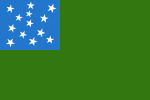
Flag of Vermont
(June 1, 1770 – June 13, 1804)
Flag of Vermont
(June 14, 1804 – April 3, 1837)
Flag of Vermont
(April 6, 1837 – April 16, 1923)
Flag of Washington
(March 5, 1923–1967)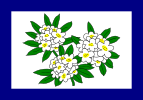
Flag of West Virginia
(1905–1907)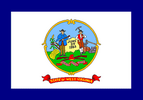
Flag of West Virginia
(1907–1929)
Flag of Wisconsin
(1866–1913)
Flag of Wisconsin
(1913–1981)
Former territory flags[]

Former Northern Mariana Islands flag (1970s)

Former Northern Mariana Islands flag (1980s)
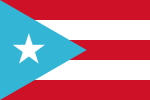
Original flag of Puerto Rico (1895–1952)
American Civil War[]

Flag of Alabama
(November 7, 1861 – November 12, 1865, obverse)[3]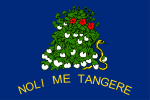
Flag of Alabama
(November 7, 1861 – November 12, 1865, reverse)[3]
Flag of Florida
(September 27, 1861, unofficial)
Flag of Mississippi
(March 30, 1861 – August 22, 1865)
Flag of North Carolina
(March 16, 1861 – March 1, 1885)
Flag of Virginia
(1861 – 1865)
Texan Revolution[]

Flag of the Republic of Texas (June 10, 1836 – June 29, 1839)

Come and Take It flag

Texas Lone Star and Stripes

The Dodson Flag

The Alamo Flag
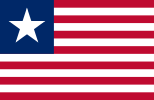
The Ensign of the First Texas Navy (1836–38)
Other[]

California Lone Star Flag 1836
Native American flags[]
Native Americans have tribal sovereignty, with Indian nations having jurisdiction over their members and Indian reservations. Although reservations are on state land, the laws of the state(s) do not necessarily apply on tribal land.[20] Below are the flags of some of the largest Indian tribes reservations by population and area:

Flag of the Osage Nation

Flag of the Uintah and Ouray Indian Reservation

Flag of the Tohono Oʼodham Nation
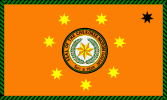
Flag of the Cherokee Nation
Unofficial flags of atolls, reefs, and other islands[]
The U.S. national flag is the official flag for all islands, atolls, and reefs composing the United States Minor Outlying Islands. However, unofficial flags are sometimes used to represent some of the insular areas in the U.S. Minor Outlying Islands:
See also[]
- Flag of the United States
- Flags of governors of the U.S. states
- List of flags of the United States (including county, city and historical flags)
- Flags of the U.S. counties
- Flags of cities of the United States
- List of U.S. state, district, and territorial insignia
- Flags of the Confederate States
Notes[]
- ^ Jump up to: a b c The current Utah design was formally adopted in 1913, slightly modifying a 1911 definition which in turn modified the unofficial 1903 flag. In practice, however, flags continued to use the 1903 design until 1922. In 1985 it was discovered that the post-1922 de-facto standard did not match the 1913 definition; this persisted until 2011, when the legislature reaffirmed its 1913 definition and requested flag manufacturers to change to it.[12]
References[]
- ^ Artimovich, Nick. "Questions & Answers". North American Vexillological Association. p. 8. Archived from the original on April 17, 2007. Retrieved 2007-03-20.
- ^ Kaye, Ted (2001-06-10). "NEW MEXICO TOPS STATE/PROVINCIAL FLAGS SURVEY, GEORGIA LOSES BY WIDE MARGIN". North American Vexillological Association. Archived from the original on October 19, 2013. Retrieved 2007-10-07.
- ^ Jump up to: a b c "State Flag of Alabama". Alabama Emblems, Symbols and Honors. Alabama Department of Archives & History. 2006-04-27. Retrieved 2007-03-18.
- ^ Anderson, Ed (November 22, 2010). "New Louisiana state flag with bleeding pelican is unfurled". The Times-Picayune. Archived from the original on November 24, 2010. Retrieved November 24, 2010.
- ^ Ramseth, Luke (November 4, 2020). "Mississippi voters approve new magnolia design for state flag. Here's what happens next". clarionledger.com. Clarion Ledger. Retrieved 4 November 2020.
- ^ "Mississippi Legislature 2020 Regular Session House Bill 1796". billstatus.ls.state.ms.us/. July 21, 2020. Retrieved 21 July 2020.
- ^ "Official State Symbols of North Carolina". North Carolina State Library. State of North Carolina. Archived from the original on 2008-02-06. Retrieved 2008-01-26.
- ^ "The Oklahoma State Flag". NetState. NState, LLC. February 6, 2014. Retrieved January 26, 2015.
Colors shall be colorfast and shall not bleed one into another. Added by Laws 1925, c. 234, p. 340, § 1. Amended by Laws 1941, p. 90, § 1; Laws 2006, c. 181, § 1, eff. Nov. 1, 2006.
- ^ "Enrolled Senate Bill No. 1359". Oklahoma State Courts Network. May 23, 2006. Retrieved January 26, 2015.
This act shall become effective November 1, 2006.
- ^ Jump up to: a b "Oregon Almanac Topics - Dance to Hops - Flag, State". Retrieved 29 Jun 2020.
Oregon is the only state whose flag has different patterns on each side. The design for the Oregon flag was adopted by the legislature in 1925.
- ^ Text states that Oregon adopted its flag in 1925
- ^
- Hartvigsen, John M. (2011). "Utah's Adoption of Two Legislative Measures Affecting the Utah State Flag" (PDF). Proceedings of the 24th International Congress of Vexillology. North American Vexillological Association. pp. 391–406.
- "Utah State Flag Concurrent Resolution, 2011 General Session, State of Utah". Retrieved February 17, 2011.
- Dennis Romboy (9 March 2011). "Utahns celebrate first State Flag Day". KSL-TV. Retrieved 10 March 2011.
- ^ Commonwealth of Virginia (February 1, 1950). "§ 1-506. Flag of the Commonwealth". Code of Virginia. Virginia: Commonwealth of Virginia. Retrieved January 28, 2015.
The flag of the Commonwealth shall be a deep blue field, with a circular white centre of the same material. Upon this circle shall be painted or embroidered, to show on both sides alike, the coat of arms of the Commonwealth, as described in § 1-500 for the obverse of the great seal of the Commonwealth; and there may be a white fringe on the outer edge, furthest from the flagstaff. This shall be known and respected as the flag of the Commonwealth. (Code 1950, § 7-32; 1966, c. 102, § 7.1-32; 2005, c. 839.)
- ^ "Symbols of Washington State". Washington State Legislature. Archived from the original on 2007-03-05. Retrieved 2007-03-11.
- ^ State of Wisconsin. "286". Section: 1.08: State flag. Laws of 1979. Retrieved August 21, 2015.
The department of administration shall ensure that all official state flags that are manufactured on or after May 1, 1981, conform to the requirements of this section. State flags manufactured before May 1, 1981, may continue to be used as state flags.
- ^ Jump up to: a b Florida Constitution Revision Commission (August 4, 2005). "Amendments, Election of 11-6-1900". The Florida State University. Archived from the original on October 8, 2014. Retrieved March 13, 2013.
- ^ [1] Archived 2014-08-12 at the Wayback Machine While this flag was officially adopted by Louisiana in 1861 there is no indication that it actually flew over state buildings up to 1912. In that year (1912) the blue pelican flag was officially adopted after nearly 100 years of unofficial use.
- ^ New Mexico's First Flag (U.S.)
- ^ New Mexico Flag Hasn't Always Had a Zia Symbol; Earliest Version Boasted Quartz Crystals, by Rick N athanson
- ^ https://www.bia.gov/frequently-asked-questions BIA. U.S. Department of the Interior. Bureau of Indian Affairs. Frequently Asked Questions. Retrieved September 7, 2019.
- ^ Klimeš, Roman (January 2011). "Lesser-Known Symbols of Minor U.S. Possessions" (PDF). NAVA News. 209.
- ^ Klimeš, Roman (January 2000). "The Flag of Wake Island" (PDF). NAVA News. 33.
External links[]
| Wikimedia Commons has media related to State flags of the United States. |
- List of State Flags at State Symbols USA
- United States state flags
- Lists of United States state insignia
- Lists of flags of the United States
- United States state insignia



















































































































































